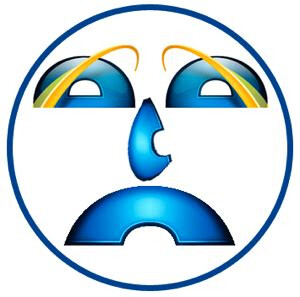In the early 2000s I had a virus delete all my data, so I was quite afraid of it, somewhat irrationally (though, I was using windoze XP back then). So I had two computers, one offline, one online, connected via switch to the same (CRT) monitor and keyboard.
Air gapping since 2000s, bravo! ![]()
Yeah, nowadays, I still use this technique for the only non-GNU PC in my house: the CNC machine controller in my workshop, which uses 𝖆𝖇𝖘𝖔𝖑𝖚𝖙𝖊𝖑𝖞 𝖕𝖗𝖔𝖕𝖗𝖎𝖊𝖙𝖆𝖗𝖞 software that requires windoze 7.
That computer doesn’t know that internet exists. ![]()
I should really convert it to Linux, but the problem is 𝖕𝖗𝖔𝖕𝖗𝖎𝖊𝖙𝖆𝖗𝖞 UC300 hardware, so I would have to change that, too. I would have to find a Free alternative that works with my stepper drivers… it gets very messy, in the end, I would have to replace half of the electronics in the machine. I’ve been putting that off for years (close to a decade, now!), since it works. And since the workshop is out of WiFi range anyway… Yeah, excuses.

Let’s assume for the sake of argument the proposal is implemented as is in e.g. Firefox. How is this new experience different when browsing the web? Which copyrighted content is newly protected by technical means? I don’t see a difference. What if every application implements it, what’s the difference? None.
Now to the more interesting part: what if a request is made which does not implement it. Is content locked away now? Let’s look at the Holdback proposal: … attestation signals must sometimes be held back for a meaningful number of requests over a significant amount of time (in other words, on a small percentage of (client, site) pairs, platforms would simulate clients that do not support this capability). - If you are able to e.g. fire up curl at any moment to receive the same content it becomes difficult to argue this is managing digital content rights.
This proposal could make introducing DRM easier because it may entrench existing web user clients even more, but it isn’t DRM in itself.
You’re just hair-splitting here.
It’s digital technology whose main purpose is to enforce copy restrictions1. It’s perfectly okay to call it DRM, although I prefer the term “defective by design”, or when it comes to software, the term “malware” is an apt one, since the purpose of such software is to mistreat the user.
1 I refuse to call it a right (as in copyright) because nobody has the right to prevent me from copying or sharing any number I want (that is my God-given right), I am just being unjustly restricted from doing so by threats of violence and 𝖕𝖗𝖔𝖕𝖗𝖎𝖊𝖙𝖆𝖗𝖞 technology. Also, as far as I’m concerned, DRM stands for “digital restrictions management”.
In the meantime, the work is in full swing.
Yeah … Brave … but in the Neeeuse anyways …
![]()
Same with Vivaldi. Vivaldi has actively been removing harmful elements from Googles code before adding it to their browser.
I’m curious why you can’t buy a plane ticket. Is it because you prefer to pay with cash?
’m curious why you can’t buy a plane ticket. Is it because you prefer to pay with cash?
Their delusion is strong cause we are not there yet. As for the plane ticket I’m not buying that cash and your passport will not get you one.
Well, not to go too OT, but there are limits on cash payments in various countries, plus entry procedures if travelling abroad (eg. visa requirements), and even to obtain that passport you might be required to produce an application via internet…then, if you want to rent a car on your arrival, you’d need a credit card…
I mean, it’s not dark yet, but I feel, as Dylan said, we’re getting there… ![]()
Who in there right mind post any thing from that goober?
I guess that would be me. Sorry I’m an idiot. I’ll leave you all now
I guess that would be me. Sorry I’m an idiot. I’ll leave you all now
Naw not a idiot, just had a temp brain fart.
just had a temp brain fart.
Are you talking about yourself? ![]()
Cut it y’all, we’re talking serious business here! ![]()
P.S. The information in this video is totally fine…but my ears are still bleeding ![]()
It’s because Google owns most of the web-browser market that they can do something like this because most people use Google Chrome or Chromium based browsers, more people should be using Firefox or other browsers that are not Chromium based.

